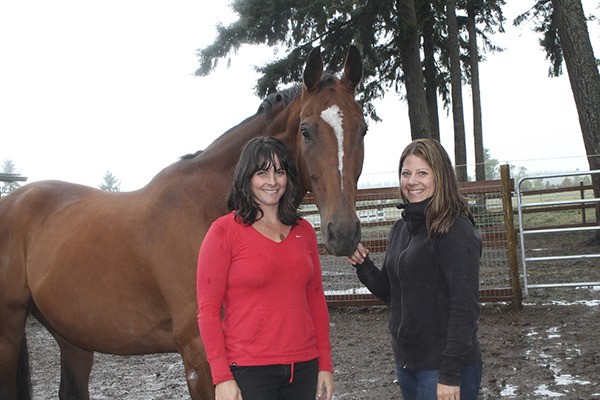As part of its goal to increase mental health support to students, Vashon High School is turning to unexpected teachers — horses — and is asking for community support to enable as many students as possible to participate in the new program this year.
In June, the high school sent nine senior girls to take part in a day-long program offered on Vashon by Axiom Equine, a program that founders Melissa Rampe and Kate Shook call “equine-assisted education.” Rampe and Shook say that the activities with their horses are designed to increase participants’ resiliency as they navigate the challenges of their own lives.
The VHS girls participated thanks to a private donation, but high school leaders say they would like to send 40 more students this year, one group as early as this fall, though the school needs the funds to do so.
Axiom Equine provides structured activities with the horses, all without lead ropes, halters or touch. The activities often result in participants learning a variety of lessons about themselves, Shook and Rampe say. Participants in the sessions do not ride, but rather through their body language and intention, work with the horses for a desired result, such as the horse coming closer or moving away. Because horses act as a mirror to the humans around them, the animals’ responses — even small reactions such as scrunched noses or ears that are held back — can reveal to students a variety of things about their behavior and body language that they did not necessarily know about themselves.
In an effort for program leaders to gauge the effectiveness of the program, the nine girls took pre-horse program and post-horse program tests, answering a range of behavioral and relationship questions. After the workshop, their scores had improved, and when the group convened one month later for a follow up and took the post-test again, the scores had remained high, DoVE Project Executive Director Betsey Archambault said. The girls also provided positive feedback directly, indicating they felt more powerful, calm and confident after they participated.
VHS Principal Danny Rock first learned of the program last spring from Archambault, and he did not hesitate to embrace the idea.
“It just immediately resonated with me,” Rock said. “I honestly want to give as many students this experience as possible. … Literally, if I had the resources I would put all my students and staff through this program.”
Faced with moving a several hundred-pound horse, students need to learn how to be confident and clear in their intention and in their bodies, he said, and the same solutions would be true when faced with other barriers in their lives.
“We do not often appreciate the effectiveness of using a physical experience to address a mental challenge,” he added.
Though the program is young, it has already successfully served local domestic violence and sexual assault survivors, so much so that Archambault intends to put client participation in DoVE’s budget next year. After several parents asked her if her agency might work toward youth suicide prevention — an area outside of its mission — she said she began to wonder if Axiom might be beneficial to island teens.
She reached out to Shook and Rampe, who quickly signed on to working with high school students, and to Rock, who told her he could readily think of 50 teens he would like to see participate.
Rock says he does not need to wait for studies to tell him that the program is effective, as there is enough evidence already to support the work.
Animals of all kinds are known to be therapeutic, as are experiences that take people out of their typical environments, he noted. He also said that some of the most effective experiences occur in a group when members facing similar challenges overcome obstacles together, whether that be students who are about to move away for college, or students who must focus on simply getting through the next day.
The high school, he said, will group participants according to gender, age and life experience to help make their participation in the program as effective as possible.
The Methodist church has provided $2,000 for upcoming students, and another donor has agreed to match community donations up to $5,000. Judith Neary, who heads Rj’s Kids, provided funds from the unofficial mayor’s race, but the school district needs $7,000 more to get all 50 of the identified students through, including $2,400 for the next group.
“We are hoping that once people become more familiar with this program, they will support it,” Archambault said.
Islander Holly Taylor, a psychotherapist and longtime horsewoman, helps facilitate the Axiom sessions. Sometimes during a session, old traumas and other issues can be triggered, she said, and she is there if any participant needs assistance.
She, too, stresses that participants take what they learn out of the program and into the everyday lives.
“That is something we talk about all during the day. It is all about relationship. It is about being yourself in relationships and carrying that out in the world,” she said.
Shook, who first knew there was more work she was supposed to be doing years ago while showing her horse, shares that view for the teens who participate.
“I really hope for confidence, self-empowerment, for them to know who they are at a young age,” she said.
People who would like to donate to this effort can drop off checks, earmarked for Axiom, at the high school or use a credit card. Donations may also be mailed to the high school at P.O. Box 547, Vashon.



